Texas Senate panel holds hearing on DEI, antisemitism. What UT chancellor said of protests
University of Texas System Chancellor J.B. Milliken said elements of the pro-Palestinian protests over the past few weeks at UT were antisemitic in response to a question from the Texas Senate Higher Education Subcommittee, citing testimony from a Jewish UT student who spoke to the panel of his experience.
The subcommittee on Tuesday held hearings with university system chancellors over their institutions' compliance with Senate Bill 17, a state law that went into effect in January and bans public universities from having diversity, equity and inclusion offices or related functions, and the hearing also focused on antisemitism on campuses and free speech policies born from Senate Bill 18, a 2019 law that made public universities' outdoor spaces traditional public forums.
Outside of the chancellors and counsels, the committee had three invited panelists — a UT student, a UT professor specializing in the First Amendment and the policy director of the Anti-Defamation League — with the student and league speakers discussing increasing antisemitism and fear affecting Jewish students due to recent pro-Palestinian protests on college campuses. No pro-Palestinian representatives were included in the subcommittee's agenda.
Sen. Brandon Creighton, R-Conroe, the author of SB 17 and the subcommittee's chairman, asked Milliken and Texas A&M System Chancellor John Sharp, "If you both recognize, especially what happened on the UT campus and across the country, that these were anti-Jewish protests in their very nature?" referring to the pro-Palestinian demonstrations on campuses.
Milliken affirmed that elements of the protests were antisemitic, and said he'd agree that they were anti-Jewish.
“Not everybody involved is an antisemite and as you heard from the law professor, we value free speech, political speech, all of that," Milliken said. "It's when it crosses a line with threats, intimidation — creating an environment where students cannot pursue their education.”
Sharp said the protests at Texas A&M campuses have been less intense, but that he has no tolerance for antisemitism.
The protests at UT called on the university and the UT System to divest from Israeli weapons manufacturers. More than 130 people were arrested over two protests at UT — the first on April 24 and another on April 29 when demonstrators set up a surprise encampment that was quickly dismantled by police.
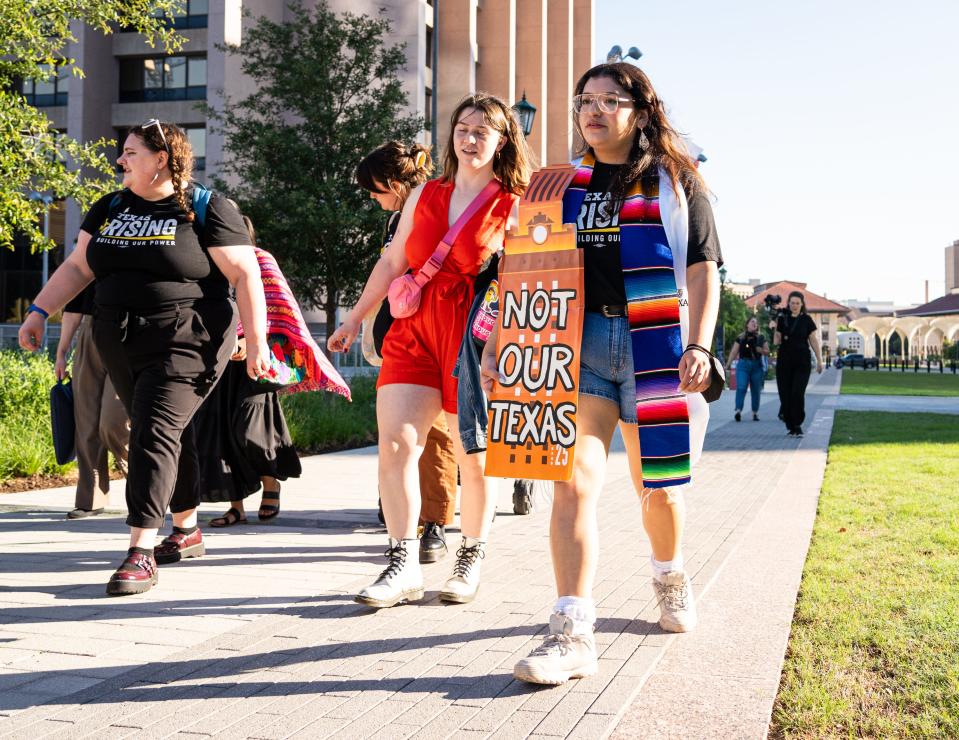
Antisemitism and campus free speech
UT sophomore Levi Fox testified to the panel about his experience with antisemitism on campus, including an encounter with a UT professor he said had approached him and verbally harassed him with an antisemitic threat.
"People ask how the Holocaust happened," Fox said. "Auschwitz wasn't built overnight. It was built as Jew hatred gradually became accepted and when society was desensitized to hate."
Fox said he knows people who have hidden their Judaism or are afraid of being seen going into Jewish spaces for fear of being targeted.
Courtney Toretto from the Anti-Defamation League said this year has had the greatest number of antisemitic incident reports since the group started collecting data decades ago. Toretto also spoke about the impact of chants like "From the river to the sea" and the "intifada," which she said call for the destruction of Jewish people in Israel.
"Many Jewish students report feeling isolated and targeted by these protests. While ADL vehemently supports the right to free speech and peaceful protest, we draw the line when conduct on campus crosses the line into harassment that threatens public safety and (students') well-being," Toretto said.
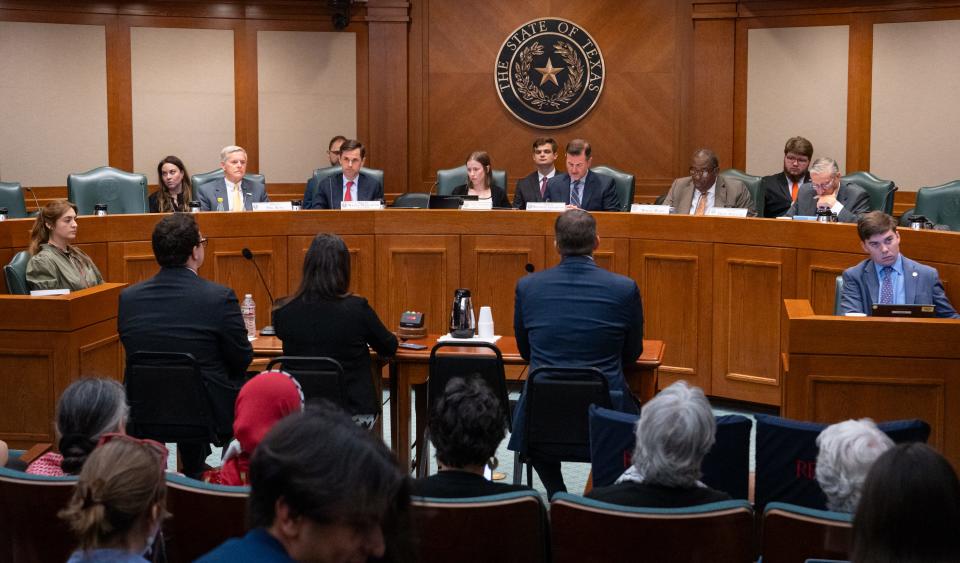
Fox told the American-Statesman after his testimony to the subcommittee that he is a staunch believer in free speech, and he hopes the Legislature guards free speech and protects Jewish students by encouraging more Holocaust education in schools. Asked when protests crossed the line, he said when there is violence and intimidation.
"There is no category of speech in United States law known as hate speech," Steven Collis, director of the Bech-Loughlin First Amendment Center and a professor at UT's Law School, told the subcommittee. But speech that incites violence or raises a "reasonable fear of imminent bodily harm" can be limited, he said.
Public universities are allowed to set reasonable restrictions and rules for protesting as long as they are implemented in a content-neutral way, he said.
"They try to conflate antisemitism with a student's right to protest and to free speech, which is wrong in and of itself," Rep. Ron Reynolds, D-Missouri City, told the Statesman after the Texas Legislative Black Caucus, which he chairs, held a news conference Tuesday over SB 17 and the right to protest.
Islamophobia was not mentioned as part of the subcommittee's agenda or at the panel. During the public testimony portion of the meeting Tuesday some speakers asked for there to be "equal protection of free speech."
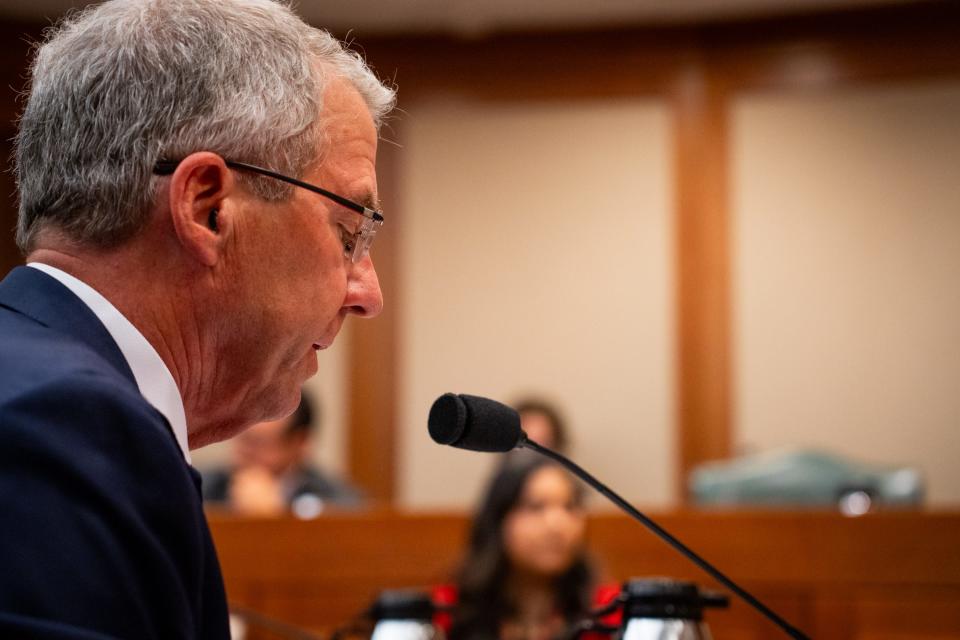
SB 17 compliance, difficulties and successes
Milliken and Sharp asserted their commitments to following SB 17 exactly as written. But UT System's general counsel, Daniel Sharphorn, told the subcommittee that the system has struggled with the law's effects on grants.
"We've struggled mightily with how to handle the grants," Sharphorn said. "Part of it is talking to the granting agency to know what laws we're dealing with. ... Right now, I don't know that we've learned enough to know what the impact is going to be."
Brooks Moore, Texas A&M System's general counsel, said he thinks the accreditor's language is broad enough that he is not worried.
Milliken said the system has reallocated about $25 million that was previously used toward DEI, according to what the institutions have reported. The system closed 21 offices, eliminated 311 full- and part-time positions, and cut about 681 contracts, programs and trainings, Milliken said.
The 311 eliminated positions include the 49 former DEI staff positions that UT President Jay Hartzell cut April 2 as part of a reorganization after SB 17 that included the closing of the adapted Division of Campus and Community Engagement, a UT System spokesperson confirmed.
Also in April, four months after the compliance deadline, UT-Dallas announced that it would close a new office created to comply with SB 17 and eliminate about 20 staff positions that had been adapted.
Creighton said there's compliance as written, and then there's compliance "beyond the four corners of the document." He said UT seemed to take a "holistic approach," including finding other duplicative efforts and inefficiencies and making changes, and he asked how it came to those conclusions.
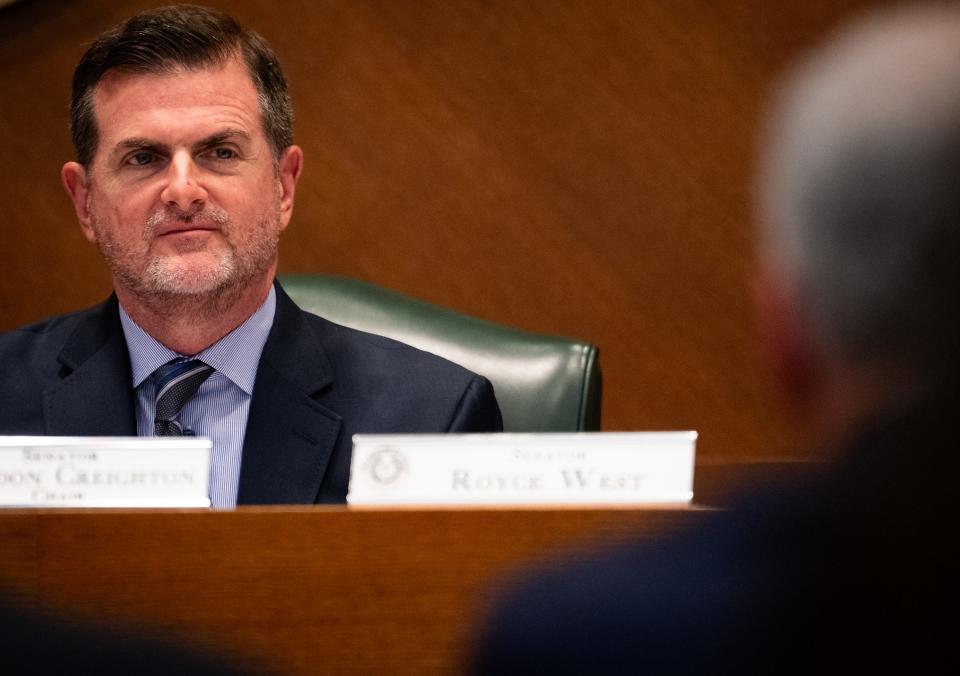
"Our board made a pretty strong statement about this last fall, that this is the law of the land, that we will fully commit to implement every element of it," Milliken said.
Sharp said the Texas A&M System had fewer DEI resources to start with, and only eight positions across the system had been eliminated, not including student positions.
Both systems asserted their ability to audit their institutions by this summer and work with state auditors.
Milliken initially said that all systems have worked together to ensure uniform compliance, but differences later emerged. In response to a question from Sen. Royce West, D-Dallas, Sharp said that Texas A&M has not changed its financial support of student groups because it is exempt from the law. At UT-Austin, sponsored student groups who had been under the now-closed Multicultural Engagement Center lost their university funding due to SB 17.
Milliken said the sponsored groups were different because they had their own university spaces and other privileges, and they are now registered organizations, which do not receive university funding.
West also asked if there is a reporting process for eliminated programs that people feel are overcompliant with the law. Milliken said the power to reinstate any programs would fall to the presidents of the institutions.
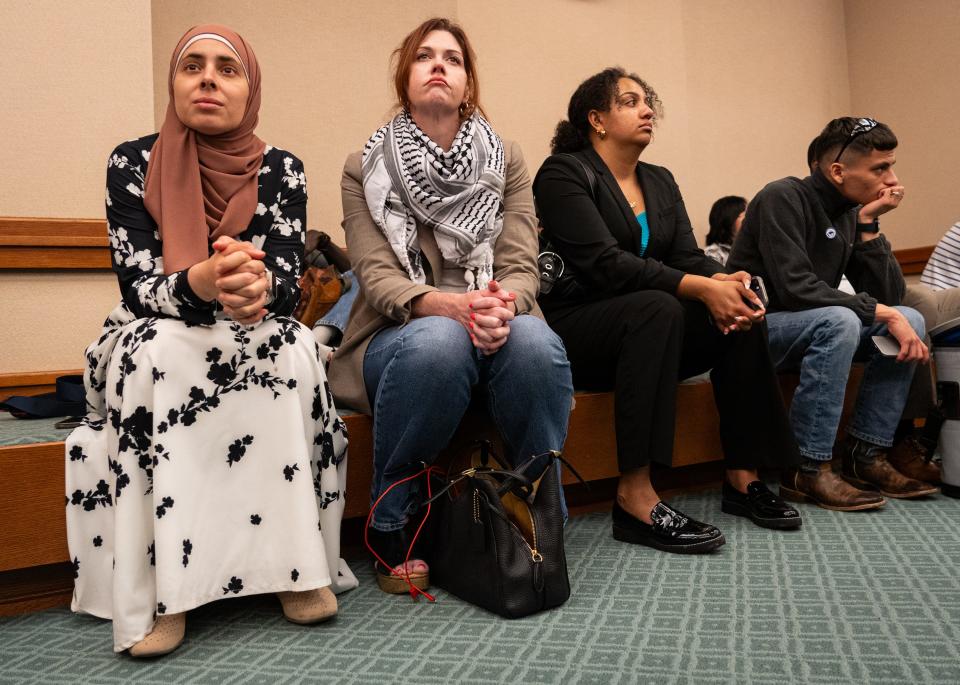
Creighton, Milliken and Sharp also stated their commitment to helping ensure access to all. Milliken pointed to the Promise Plus endowment at the UT-Rio Grande Valley campus, which covers all tuition for students whose families makes a combined income of less than $100,000.
Gary Bledsoe, president of the Texas Chapter of the NAACP, spoke at the news conference the Texas Legislative Black Caucus and other organizations held at the same time as the hearing. In an interview with the Statesman, he said DEI is intended to help all, and the absence of it has created a "hostile" environment at UT.
"If you think somebody's not included in DEI, change the definition and the scope and keep the existing people," Bledsoe said. "That shows again that it's a lie."
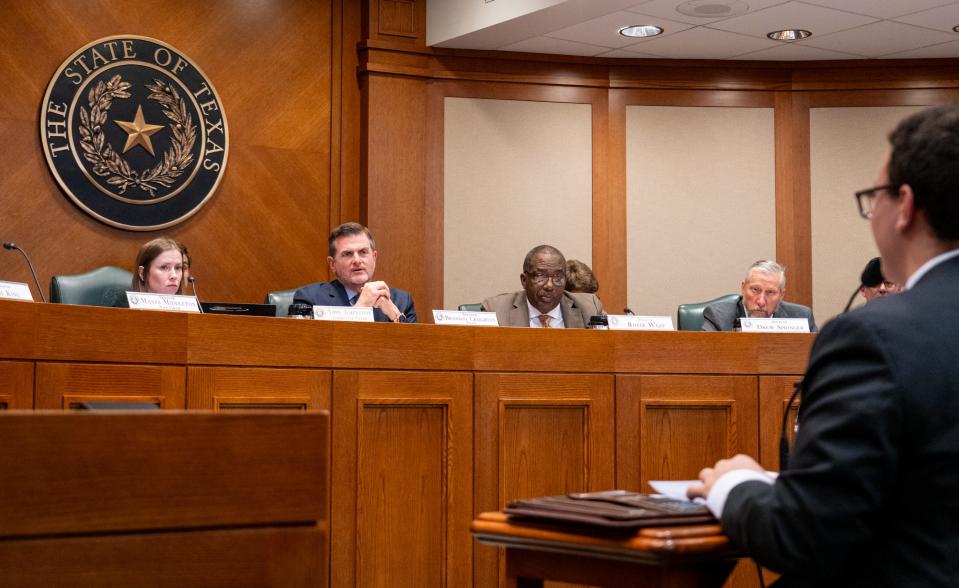
Editor's note: This story has been updated with an additional quote from Milliken adding more context to his statements about the antisemitic elements of the pro-Palestine protests at UT.
This article originally appeared on Austin American-Statesman: How Texas is following anti-DEI compliance, free speech at colleges

